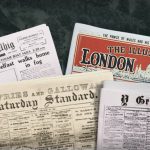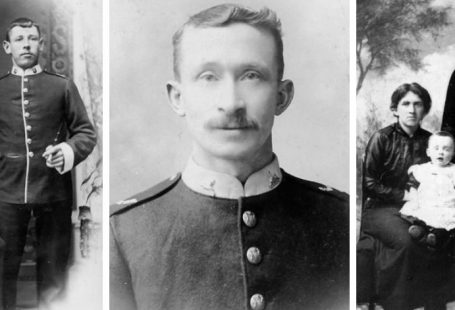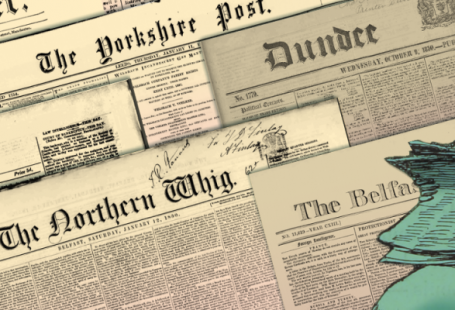On 20 July 1969, two American astronauts, Neil Armstrong and Buzz Aldrin, landed on the moon, thus becoming the first two humans ever to walk on the lunar surface.

These first steps were watched by an estimated audience of 650 million viewers worldwide, as the Apollo 11 mission became a veritable global media sensation.
But how was the moon landing reported on by the British media? As part of space and the stars month here at The Archive, we have collated ten front pages from 21 July 1969, the day after the moon landings, from newspapers based in the United Kingdom. The tidings from space were veritable front page news, and the British press reacted accordingly.

And so, without any further ado, here are ten front pages from 21 July 1969, which detail what is perhaps one of the most significant events in human history.
Register with us today and see what stories you can discover
1. Daily Mirror – ‘Man Walks On The Moon’

National newspaper the Daily Mirror on 21 July 1969 plumped for five words and a picture to commemorate on its front page the first ever moon landing, the headline simply reading: ‘Man Walks On The Moon.’
The picture shows ‘Astronaut Armstrong’ feeling ‘gingerly with his foot for the Moon surface,’ as he walked on the moon at 03.56 GMT, the actual landing of the mission on the moon having taken place at 20.17 GMT.
Indeed, that day’s Daily Mirror was given over to the achievement of the Apollo 11 mission, with the full story given on the back page, more pictures filling pages two and three, and more information contained on the centre pages.
Top tip: you can search for newspapers from an exact day using our advanced search tool.
2. Aberdeen Press and Journal – ‘The Historic Footsteps’
Also concentrating on those ‘historic footsteps’ was Scottish newspaper the Aberdeen Press and Journal, which included an illustration depicting astronaut Neil Armstrong’s ‘early stroll on the moon.’
The newspaper’s front page reported how:
Man has landed and walked on the moon. Americans Neil Armstrong and Edwin Aldrin, 240,000 miles from the planet earth, had settled to a dusty landing on the moon’s alien soil at 9.17 p.m. BST yesterday and it was Armstrong who made the first footprint on that strange globe.
In heightened, romantic language, the Aberdeen Press and Journal described how the history making pair ‘had been impatient to be out – to complete man’s ancient dream.’

The newspaper also contained details of Buzz Aldrin’s first impressions of the moon, as he radioed:
We’ll get to the details of what’s around here. But it looks like a collection of every variety of shape, angularity, granularity: a collection of just about every kind of rock. Colour depends on what angle you’re looking at…Rocks and boulders look as though they’re going to have some interesting colours.
Providing a further in-depth analysis of the moon landing, the Aberdeen Press and Journal also advised its readers how:
BBC and ITV will both cover today’s historic events, including the blast-off from the moon and the moment the lunar module re-joins the command module in moon orbit.
3. Reading Evening Post – ‘One small step’
Meanwhile regional newspaper the Reading Evening Post went with the famous phrase coined that day as its front page headline: ‘One small step.’
The newspaper contained the words uttered by Neil Armstrong as he stepped onto the moon’s surface, the ‘culmination of man’s dreams, eight years of fantastic effort and the spending of £10,000 million:’
‘That’s one small step for man, but what a giant leap for mankind,’ Armstrong told the word.’

The Reading Evening Post gave a blow by blow account of Armstrong’s first steps on the moon, and how he came to take them:
At 3.44 am Armstrong began climbing on to the porch – a small platform at the top of the ladder. ‘All set,’ said Aldrin. Armstrong checked the visors over his space helmet before getting out. Then came the mundane words – momentous at this time – as Aldrin guided Armstrong out of the hatch.
‘OK Houston, I’m on the porch,’ called Armstrong at 3.51 am. As he climbed down the nine-rung ladder Armstrong opened an equipment bay housing a TV camera. ‘I’m going to pull it now, he said at 3.53 am.
Just one minute later after a brisk radio check, the first dramatic picture of man’s foot reaching for the moon appeared…

The Reading Evening Post continued its account:
‘I am at the foot of the ladder,’ he announced calmly. ‘The surface appears to be very, very fine, grained as you get close to it. It is almost like a powder as you get down there. It is very fine…I can kick it up loosely with my toe.’
The newspaper poignantly added how the footsteps made by Neil Armstrong ‘will last for 500,000 years – there is no process of erosion as on Earth.’
4. Newcastle Journal – ‘The first moonwalk’
The Newcastle Journal, meanwhile, on 21 July 1969 also devoted its front page to the ‘first moonwalk,’ detailing how ‘Man today put his first footprint on a world other than his own.’
The newspaper also described Buzz Aldrin’s first steps onto the moon, as he exited the Eagle craft:
Aldrin dangled his foot for a moment, then dropped easily to the full extent of his arms. He pulled himself up again once – an easy feat in the light gravity – then dropped to the 37-inch diameter footpad and stepped off on to the surface.

The Newcastle Journal relates how ‘The men moved with a curious bouncing, floating motion, like someone walking under water,’ as they inspected and collected the rocks around them. They also unveiled a plaque ‘on the front leg of the lunar lander,’ which read: ‘Here men from planet earth first set foot on the moon, July, 1969. We came in peace for all mankind.’
Meanwhile, the newspaper reported on the worldwide reaction to the moon landing, as ‘Kings, presidents and prime minsters throughout the world hailed the moon landing.’ Amongst them was British Prime Minister Harold Wilson, who wished the astronauts a safe return, whilst Pope Paul VI proclaimed: ‘Glory to God in the highest and peace on earth to men of good will.’
Register with us to access three FREE pages
5. Birmingham Daily Post – ‘Man Arrives On The Moon’
On 21 July 1969 the Birmingham Daily Post’s front page proclaimed how man had arrived ‘on the moon,’ featuring photographs of astronauts Neil Armstrong and Buzz Aldrin prior to the Apollo 11 mission.
The newspaper described their ‘perfect descent,’ as:
Two pioneers from planet Earth landed safely last night on the surface of the moon. American Apollo 11 astronauts Neil A. Armstrong and Edwin E. Aldrin flew their fragile spacecraft to a frightening but safe touchdown at 9.18 last night. Their landing realised the dream of centuries. For the first time, men actually rest on an alien world.

Indeed, Aldrin described the landing as a ‘very smooth touchdown.’
The Birmingham Daily Post furthermore reported in detail the detachment from command ship Columbia, which was being piloted by Michael Collins. As the Eagle made the descent, Collins was heard to comment: ‘Listen, babe, everything’s going just swimmingly, beautiful.’
6. Coventry Evening Telegraph – ‘This Is It – Man On The Moon’

The Birmingham Daily Post’s neighbouring newspaper the Coventry Evening Telegraph, meanwhile, on 21 July 1969 went for a full front page on the moon landing, like the Daily Mirror’s.
It proclaimed – ‘This Is It – Man On The Moon’ – whilst detailing how ‘Neil Armstrong and Edwin Aldrin clambered safely back into their moonship today and slept, after leaving man’s first footprints on the surface of the moon.’
Retreating to the Eagle ‘after a two hour television spectacular,’ Armstrong and Aldrin went twenty minutes without radio contact once they had returned to the landing craft.
You can limit your search to front pages by selecting ‘Front page articles only’ on our advanced search page.
7. Torbay Express and South Devon Echo – ‘Moon men sleep’
Meanwhile, Devon paper the Torbay Express and South Devon Echo on 21 July 1969 decided to concentrate their front page headline on how astronauts Neil Armstrong and Buzz Aldrin slept on the moon after their moonwalk.
It also concentrated on the worldwide reaction to the amazing achievement attained by the Apollo 11 mission, concentrating in particular upon the Russian reaction, the Russians and the Americans having been engaged throughout the preceding years in a ‘space race.’ The Torbay Express detailed how:
Moscow television today broadcast seven minutes of film of the walk on the Moon by U.S. Apollo-11 astronauts but, in general, the Soviet Union maintained its low-key treatment of the epic event. By the time the recording of the walk was shown on television, just after 10 a.m., Moscow time, the official Tass news agency had devoted a total of five paragraphs to the Apollo saga.

Meanwhile, the Queen offered the following statement of congratulations to President Nixon:
I send my warmest congratulations to you, to the crew of Apollo 11, and to the American people on the historic occasion of man’s first landing on the moon. I am filled with admiration for the fortitude of astronauts Armstrong, Aldrin, and Collins, whose exploits add a new dimension to man’s knowledge of the universe. I offer my good wishes and prayers for their safe return.
8. Aberdeen Evening Express – ‘Moonlift!’
Other newspapers, meanwhile, looked to the next stage of the Apollo 11 mission: leaving the moon. Scottish newspaper the Aberdeen Evening Express on 21 July 1969 reported how:
Astronauts Neil Armstrong and Edwin Aldrin are ready for the next critical stage of their Moon programme. At 18.55 tonight Eagle, the lunar module, bids to re-join the mother-ship, Columbia, orbiting 60 miles above the moon.

And as other newspapers reported on the sleeping astronauts, the Aberdeen Evening Express claimed that ‘Armstrong apparently had not managed to sleep after his historic achievement.’ Mission control back in Houston, Texas, was monitoring his heartbeat, which showed that although the astronaut was resting, he was not asleep.

Meanwhile the Aberdeen Evening Express detailed the reaction of the Apollo 11 astronauts’ families. Mrs Stephen Armstrong, mother of Neil, spoke from her home in Wapakoneta, Ohio, and said:
I worried that they might sink in too deep. But no, they didn’t. So it was wonderful.
Janet, Neil Armstrong’s wife, was sitting on the bed in her room as she watched the moon landing, letting her two children Eric (12) and Mark (6) stay up ‘as long as they could keep their eyes open to watch their father walking on the moon.’ Meanwhile Joan, Buzz Aldrin’s wife, could not sit down as she watched the landing, whilst Patricia, Michael Collins’s wife, said ‘she was not disappointed with his role.’
9. Belfast Telegraph – ‘The Last Big Gamble’
Northern Irish newspaper the Belfast Telegraph also concentrated its front page on the ‘Last Big Gamble,’ the forthcoming ‘moon lift-off’ which was projected to take place at 6.55 p.m. William Humphries, writing for the newspaper, described how:
Ahead of them lies their last big gamble. At five minutes to seven this evening – if the flight plan is adhered to – they will fire up their ascent engine to lift off from the moon’s surface and dock with the mother ship Columbia.

The Belfast Telegraph also took a look at how the moon landing was observed within the local community. Colin Brady, for the newspaper, described how the aptly named Mrs. Helen Moon had taken the television set to bed in order to watch Armstrong and Aldrin walking on the moon, whilst also confessing how ‘the neighbours have given up making cracks about the name.’
Meanwhile, the Belfast Telegraph detailed how the Post Office’s ‘wake-me-up’ service struggled with an influx of calls ‘from stargazers who didn’t want to sleep-in on the new epoch.’ And at the Armagh Observatory, astronomers struggled to even see the moon, as there was heavy cloud cover. Its director, Dr. Eric Lindsay, unlike the rest of the world, seemed rather nonplussed by the events:
This may sound awful, but I was in bed when the first astronaut stepped out this morning.
10. Nottingham Evening Post – ‘Blast-Off Next Hurdle’

Our final newspaper front page comes from the Nottingham Evening Post, which also concentrated on the ‘next hurdle’ of Neil Armstrong and Buzz Aldrin leaving the moon’s surface. The newspaper furthermore detailed how it was expected that at ‘5.57 a.m. tomorrow, Armstrong, Aldrin, and Collins will begin their journey back to earth.’
Meanwhile, the Nottingham Evening Post reported how the European Broadcasting Union ‘estimated that about 600 million people, or one-fifth of the world’s population, watched the live television pictures of man’s first steps on the moon.’ The Central Electricity Generating Board in Britain saw a demand for power between 3 a.m. and 4.30 a.m. to the figure of 800,000 kilowatts or ‘enough to meet the normal needs of a city of one million people,’ which was taken as ‘quite a good indication that a lot of people were watching the moon walk.’

Finally, the Nottingham Evening Post pictured Pope Paul VI taking ‘a peep’ via the powerful telescope at the Pontifical Observatory at Castel Gandolfo ‘to look at the lunar zone where the astronauts had landed.’
Nothing had quite united the world like this before, this spectacle of two astronauts walking on the moon. Millions were united in their awe, and the papers of the United Kingdom were no different. It is fascinating to see how each of these ten front pages reported on the news, each with their own little bits of extra information, or a slightly different take.
Discover more about the remarkable stories of the past by searching the pages of our Archive today.







